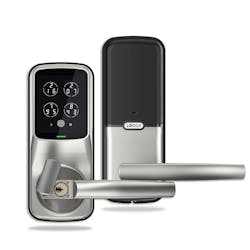LOCKLY Looks to Stand Out in Crowded Smart-Lock Market

In what once would have been a relatively easy task, standing apart in today’s smart-lock market has become increasingly difficult. As many features, designs and finishes now are available for connected locks as there are for good old-fashioned keyed deadbolts and doorknobs.
Each passing year, the innovations that companies bring to the table never cease to amaze, as evidenced by the solutions on display at this year’s all-virtual Consumer Electronics Show. Among the crowd of smart-lock manufacturers was LOCKLY, a company that began as an OEM provider of locks to some of the industry’s more well-known brands and subsequently built its own line of products.
One lock, dubbed LOCKLY Vision, incorporates a camera into the lock itself, so it serves as a video doorbell. It even includes a fingerprint reader. Earlier this week, the company announced that it’s adding two products, the LOCKLY Duo and LOCKLY Guard, to its portfolio.
The Duo essentially combines a smart latch and deadbolt into a single device. When a user enters a building and turns up the latch handle, the device’s Dual-Locking Technology simultaneously secures the latch and deadbolt in a single motion. The Duo also features a touchscreen keypad and a fingerprint reader on the side, similar to the Vision. The LOCKLY Guard is designed to fit existing and new sliding and swing-style doors and features an optional radio-frequency ID card reader.
According to Jeff Pouliot, LOCKLY’s head of sales, one thing that differentiates LOCKLY from other manufacturers is the company’s patented PIN Genie technology. The technology randomizes the number sequences of its touchscreen keypad, which helps to prevent codes from being guessed or watched by someone from behind.
“With other traditional smart locks, they have what I call the static ‘1-9’ [configuration], and if you go to somebody’s house, you can typically see the smudge or ‘Cheetos dust’ and kind of see where their fingerprints have been,” Pouliot explains. “With our PIN Genie keypad, we have four circles with three numbers in those circles, and every time you enter your code, the numbers change.”
Although LOCKLY rolled out its products as DIY offerings at retailers such as The Home Depot and Lowe’s, Pouliot says one of the company’s goals in 2021 is to make a bigger push into the professional channel and have security pros install their locks in residential and commercial markets. In fact, Pouliot says, the company has been in discussions with security distributors to get LOCKLY’s products on the shelves for security pros.
“Last year, if you put a banner over LOCKLY, we were focused on retail,” Pouliot says. “If you look at 2021, we’re still going to support retail, but our solutions that we’ve announced at CES do lean more toward commercial and pro [installers]. Duo is probably 80 percent positioned as a commercial, professional installation [solution], and Guard is 100 percent commercial and pro. You need to have an installer because of the different makeups on sliding and swing doors. You need to have a professional installer to make sure that solution is set up correctly.”
To learn more about LOCKLY and its suite of products, visit https://lockly.com/.
Joel Griffin is editor-in-chief of SecurityInfoWatch.com. He can be reached at [email protected].
About the Author
Joel Griffin
Joel Griffin is the Editor of SecurityInfoWatch.com and a veteran security journalist. You can reach him at [email protected].